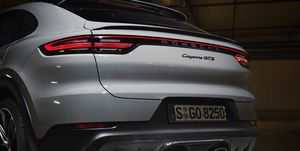While rivals are pledging to go 100 percent electric by 2030, Porsche has only committed to be more than 80 percent electric. That less than 20 percent difference is carving out an exception for the 911. Per the brand, an all-electric 911 isn’t coming this decade (though a hybrid should soon). And it appears Porsche will try to keep the combustion 911 around as long as possible.
Here’s what we know about how and why.
Taking the Porsche 911 electric is a technical challenge
Manufacturers can make EVs go quickly. A 4.5-ton GMC Hummer EV SUT can dump its mammoth torque and accelerate from 0 to 60 mph in 3.0 seconds. But EV battery packs are still heavy. Manufacturers haven’t quite figured out how to make EVs enjoyably sporty, incorporating noise and visceral, manual driving.
Porsche will build an electric 911 when they can figure out how to do it right, rather than have a 5,000-pound brick that sort of looks like a 911. And nailing that result may not be feasible with current battery tech. That isn’t to say Porsche isn’t building an electric sports car. But thee brand isn't ready to give it the 911 imprimatur yet.
The used 911 market is still vital for Porsche
Most cars depreciate. One of the magical parts of buying a 911 is that it will hold its value tremendously well, potentially increasing depending on the car's rarity. And the 911’s tradition is what makes the Porsche badge special, even if settling for a Macan or Cayenne makes more sense for most buyers. Keeping those used cars valuable is essential, even if Porsche can eventually build an electric 911. The answer to what happens if the used 911 market collapses is that Porsche doesn’t want to find out.
Porsche plans to save the 911 with eFuel
Porsche is developing a form of e-Gasoline. A plant is already set up in Chile with plans to expand. The fuel itself would function like gasoline does now and work without technical modifications to current combustion engines. The critical difference is the sourcing. Instead of pumping out fossil fuels from the ground and adding that carbon to the atmosphere, e-Gasoline would pull carbon already in the atmosphere and “recycle” it.
Facilities that produce it would run on clean energy. Per Porsche’s calculations, that would reduce emissions from using the fuel by around 85 percent through its life cycle.
Wait, aren't combustion vehicles being banned?
Yes. Though there may be ways around the rules. After some lobbying from Germany, it looks as though the European Union combustion ban set to be enacted in 2035 will include an exception for vehicles that run on e-fuels. Such lobbying may prove fruitful in other markets considering combustion bans.
So eFuel will save combustion cars then. Let’s all buy Land Cruisers?
Not quite. The cost needs to come down for eFuels to be viable. According to MotorTrend, current prices for eFuels would work out to $45 per gallon. Even if Porsche does bring the cost down, using it will probably still be more costly and less convenient than buying an EV — note that Porsche is still planning to be mostly electric. The eFuel will likely be reserved for niche cases like vintage cars, auto racing and the odd high-end sports car rather than daily driving.
Where eFuel could come into play more broadly would be aviation, where changes to hardware in use would be more costly and happen on a much slower timescale.





















